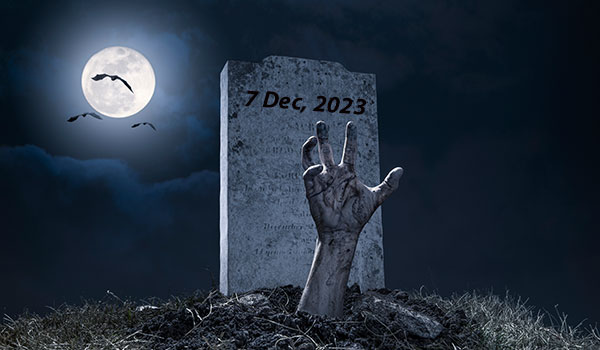
Employers who find themselves on the Fair Work Commission’s list of ‘Zombie Agreements’ need to alert their workforce, and take steps to either replace or extend the life of their agreement or prepare to revert to modern awards on 7 December. But even if you’re not on the list, it could pay to be aware of important changes to your competitive landscape that might be on the way.
For the uninitiated, “Zombie Agreements” are individual or collective registered agreements made before 1 January 2010. You might have noticed an explosion in online content during February referring to them.
That’s because on 14 February 2023, the Fair Work Commission (FWC) released a list containing over 100,000 possible Zombie Agreements – all of which are due to “sunset” (that is, cease operating and never be able to operate again) on 7 December 2023 unless the employers covered by them take steps beforehand to replace or extend the life of the agreement.
Anecdotally, it appears the list may contain some historical agreements that have already been replaced by newer deals and are not in fact operating as ‘Zombie Agreements’. However, this may be offset to a degree by FWC’s disclaimer that it is not a complete list, and excludes some collective agreements made between 2006 to 2009 (for which it has no records) as well as all individual registered deals (such as Australian Workplace Agreements) made prior to the Fair Work Act 2009.
Why the focus on Zombie Agreements?
Any instrument classified as a “Zombie Agreement” was made before modern awards were in place as the benchmark against which employees covered by the agreement needed to be assessed as being “better off overall” for the agreement to be approved.
Whilst this test has varied over time, employers who secured an agreement during the window immediately after Work Choices was introduced were only required to meet (5) core conditions in the (then) Australian Fair Pay and Conditions Standard (now superseded by the 11 National Employment Standards) and were otherwise able to trade away any (and potentially, all) penalties, loadings and allowances from the underpinning State or Federal award (with the exception of certain outworker terms).
Since then, the only requirement an employer covered by a Zombie Agreement must meet is to ensure the minimum rate of pay under the agreement is at least equal to the minimum rate of pay to which an employee would be entitled under a modern award (if the agreement did not apply). So, for example, an employer who negotiated a “flat” rate of pay for all hours worked has been able to lawfully continue to pay the minimum award rate for all hours. In comparison, a competitor operating under the modern award (or an enterprise agreement required to have made employees better off overall than the modern award) is typically required to compensate employees with additional penalties and loadings for overtime, shift work and weekend hours – together with any allowances that may apply to the work being performed.
Whilst many employers with Zombie Agreements may well be paying rates in excess of the award minimums, it may also be the case that their agreements contain flexibilities that are not available to employers under modern awards (or which would be either unlikely or impossible to negotiate in a new enterprise agreement and leave employees better off overall compared to a modern award).
For example, they may not be subject to the same requirements around matters such as engaging employees for a minimum period of time on each shift or occasion, meal and rest breaks, rules regarding how employees are required to be rostered and the maximum number of days of the week on which an employee can work their ordinary hours.
If you are an employer with one or more Zombie Agreements on the list …
The FWC has issued guidance for employers with one or more Zombie Agreements on the list, on what this means and the steps they need to take prior to then. Members of Australian Industry Group can also access our members-only advice.
Employers must give written notice to each employee covered by the affected agreement that the agreement will sunset, including information about the timing and the FWC’s role in extending the default period for continued operation by no later than 6 June 2023 or otherwise face exposure to penalties. Ai Group members are able to access a template notification to their workforce here for the purpose of complying with this requirement.
For some employers who have had the benefit of Zombie Agreements, the removal of these flexibilities could challenge fundamental aspects of their operating model.
The window between now and 7 December 2023 may involve the need to reconsider the way and when services are able to be offered to clients, hours of operation, pricing, production rosters and the value of labour cost components upon which work is tendered for and won.
Ai Group is supporting employers through this period by:
What’s in it for employers who aren’t on the list?
FWC urges employers to check the list if they are currently covered by an agreement that was made before 2010.
Employers who engage their workforce under one or more modern awards, or more recently negotiated enterprise agreements, may assume the Zombie Agreement changes have no impact on them. For some, that may be true.
Employers who have retained their Zombie Agreements to date have not done anything unlawful. Indeed, the Secure Job Better Pay changes permit employers to apply to the Fair Work Commission to continue to prolong the life of these instruments. However, it may be that these agreements have enabled some businesses to utilise their workforce more flexibly and potentially with a lower cost base than employers operating under a modern award or post-1 January 2010 agreement.
For this reason, employers who are not on the list would be wise to use this time to update their scan of the competitive landscape and assess how these changes may flow on to their own business:
The list of Zombie Agreements was published by the FWC on 14 February 2023 and is available here. It contains tens of thousands of agreements across a range of industries including:
If you’re in one of these industries, and curious to understand the impact of the Zombie Agreement changes on your competitive landscape but find the list (or the thought of reviewing agreements) overwhelming, Ai Group can assist by:
* Subject to the employer applying to extend the life of the Agreement

Leanne is a Principal Adviser in the Newcastle team of the Australian Industry Group with 20 years’ experience in industrial and employment law. If you’d like to better understand how the evolving Australian workplace law framework impacts your business, reach out to Leanne at leanne.cruden@aigroup.com.au